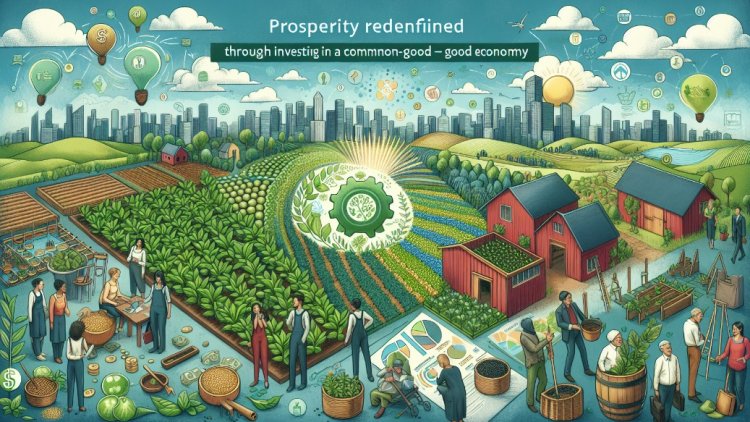Rethinking Prosperity: Investing in a Common Good Economy
"Explore 'Rethinking Prosperity,' a thought-provoking article on shifting towards a common good economy. It delves into sustainable investment strategies, the importance of social and environmental responsibility, and the transformative potential of prioritizing collective well-being in economic planning."

Introduction
The traditional path to prosperity has long been defined by fast growth and maximum profit. However, there is a growing skepticism towards profit as the sole measure of success. Many individuals and companies are questioning whether being "in the black" is the only indicator of prosperity. They are recognising the need for investments that not only generate financial returns but also do good for society and the environment.
This shift towards investing in a common-good economy is gaining momentum. People are realising that success should be measured not just by profit but also by its positive impact on society. This new idea of prosperity challenges the top-down imposed economy and focuses on bigger goals, such as sustainability, social responsibility, and community well-being.
In this new era of prosperity, individuals and companies are transitioning to a different way of thinking and investing. They are seeking opportunities to make a positive difference while still achieving financial success. This section will explore various examples of investments and initiatives that are reshaping the concept of prosperity, from organic farming and regional partnerships to crowd-investing and community-driven projects.
Investing in Organic Farming: The Economy for the Common Good
The Engemann family's mission at their farm in Willebadessen, Germany, is to do good and taste good. They believe in the concept of the common good balance sheet, which measures how well a company promotes the common good across all areas of its business. By practicing organic farming and working closely with regional partners, the Engemanns can make a positive impact on society and the environment.
Organic farming is at the heart of the Engemanns' mission. They believe in nature conservation and rely on sustainable farming practices to produce their fruits and vegetables. By avoiding the use of synthetic chemicals and genetically modified organisms, they can provide customers with high-quality produce that is not only delicious but also better for their health.
The Engemanns also understand the importance of collaboration and cooperation. They work closely with regional food producers, supplying them with their own fruit while also selling their produce alongside other organic farms. This collaboration not only strengthens the local economy but also promotes a sense of community and support among farmers.
By following the principles of the common good economy, the Engemanns demonstrate that a profitable business can also benefit society and the environment. They prioritize openness and transparency, not only with their customers but also with their employees. By giving their employees a say in important decisions through quality circles, they foster a sense of motivation and empowerment.
Investing in organic farming and supporting initiatives like the common good economy has a positive impact on society and the environment. It allows individuals and companies to make a difference while still achieving financial success. By choosing to invest in projects that align with their values, such as sustainable cookers in Kenya or local community centers in Scotland, investors can contribute to a better future for everyone.
Crowd-Investing for Sustainable Projects
Investing in projects that prioritize sustainability and social impact is becoming increasingly important in today's world. Stefan Hatos, an IT specialist and advocate for climate protection, recognized the need for environmentally-friendly investments. He wanted to put his money towards projects that not only generated financial returns but also had a positive effect on the environment.
After searching for a long time, Stefan found what he was looking for through crowd-investing. He decided to invest in a Kenyan project that aimed to reduce CO2 emissions by developing more sustainable cookers. These cookers used less fuel and helped people save money while also benefiting the environment.
Stefan and his wife invested in the African company through the crowd-investing platform Bettervest. Crowd-investing is a form of crowd-funding that allows many small investors to support projects that align with their values. Bettervest manages sustainable projects around the world, providing individuals with opportunities to invest in initiatives that reduce CO2 emissions and promote social welfare.
The concept of crowd-investing offers several benefits. Firstly, it allows individuals to have a direct impact on projects that they believe in. By pooling together small investments, these projects can receive the necessary funding to succeed. Additionally, crowd-investing provides investors with financial returns, allowing them to both make a positive difference and achieve personal financial goals.
By supporting crowd-investing initiatives that aim to reduce CO2 emissions, investors like Stefan contribute to the fight against climate change. Each sustainable project funded through crowd-investing helps to protect the environment and create a better future for everyone.
Climate training and household sustainability
Climate training has a significant impact on households, helping them become more aware of their environmental footprint and encouraging sustainable practices. By participating in climate training, individuals and families can learn about the importance of reducing their carbon emissions and the small changes they can make to have a big impact.
Examples of small changes with a big impact include:
-
Reducing energy consumption by turning off lights and electronics when not in use.
-
Using energy-efficient appliances and light bulbs.
-
Lowering the thermostat during the winter and raising it during the summer.
-
Practicing water conservation by taking shorter showers and fixing leaks.
-
Reducing waste by recycling and composting.
These simple adjustments can help households reduce their carbon footprint, save money on utility bills, and contribute to a more sustainable future.
Münster, a city in Germany, conducted a model experiment to showcase the impact of climate training on household CO2 reduction. The results were impressive, with participating households able to save around 2.5 metric tonnes of CO2 per year. Extrapolated to all households in the city, this would be equivalent to the annual CO2 emissions of approximately 170,000 cars.
Local authorities play a crucial role in promoting household sustainability. They can provide climate training programs, resources, and incentives to encourage residents to adopt sustainable practices. By working closely with communities, local authorities can help create a culture of sustainability and support initiatives that reduce carbon emissions.
Investing in climate training and promoting household sustainability is vital for addressing climate change and creating a better future for everyone. By making small changes in our daily lives and receiving guidance from local authorities, we can all contribute to a more sustainable and prosperous world.
Building a Wellbeing Economy: Community Initiatives in Scotland
In Scotland, there are inspiring community initiatives that are driving the transition towards a well-being economy. These initiatives prioritize the common good and focus on achieving a positive impact on society and the environment. Let's take a look at some notable examples:
The Linwood Foundation's Response to Economic Decline
In the Glasgow suburb of Linwood, a group of women formed the Linwood Foundation to address the economic decline in their town. They asked the residents what they needed, and one of the top requests was access to low-cost, high-quality produce. The foundation now runs a delivery service for fresh fruits and vegetables, catering to neighborhoods where shops have closed down. They prioritize capturing the local pound, ensuring that the money spent stays within the community, and supporting future development projects.
The foundation also manages a community center and a football pitch, providing spaces for sports, gatherings, and performances. These projects not only improve the well-being of the residents but also contribute to the local economy. The Linwood Foundation's initiatives demonstrate the power of community-driven projects to revitalize an area and create opportunities for its residents.
Promoting a Wellbeing Economy in Scotland
The Scottish government has recognized the need for a shift towards a well-being economy. They aim to align the country's economic system with the common good, focusing on local investment, job creation, and shorter supply chains. The goal is to measure success not only in financial terms but also in terms of societal well-being, education, environmental protection, and more.
Scotland is part of the Wellbeing Economy Governments Partnership, along with Finland, Wales, Iceland, and New Zealand. This international collaboration aims to reshape economies to prioritize well-being and sustainable development. Political scientist Katherine Trebeck, from the Wellbeing Economy Alliance, has been advising Scottish initiatives, including the Linwood Foundation, to promote a holistic approach to prosperity.
Investing in local projects and short supply chains
A key aspect of building a well-being economy is investing in local projects and promoting shorter supply chains. By supporting local businesses and initiatives, communities can retain wealth within their region and foster economic resilience. The Linwood Foundation's efforts to capture the local pound and reinvest it in the community exemplify this approach.
Shorter supply chains also have environmental benefits, reducing carbon emissions associated with long-distance transportation. By sourcing products locally, communities can support sustainable farming practices, reduce waste, and strengthen regional partnerships.
Measuring Success Beyond Finances
In a welfare economy, success is not solely measured by financial indicators like GDP. Instead, a broader set of indicators is used to evaluate the well-being of individuals and communities. This includes factors such as access to education, social cohesion, environmental protection, and overall quality of life.
In Scotland, there are ongoing efforts to develop new indicators that capture these dimensions of well-being. By incorporating these indicators into a state balance sheet, Scotland aims to create a more comprehensive measure of success that goes beyond traditional economic metrics.
The community initiatives in Scotland are paving the way for a well-being economy that prioritizes the common good. By investing in local projects, promoting community well-being, and redefining success, these initiatives demonstrate that prosperity can be achieved while also making a positive impact on society and the environment.
Conclusion
Embracing a new form of prosperity is essential in today's world. The traditional path of fast growth and maximum profit is no longer sufficient. We must redefine success and consider its positive impact on society and the environment. Investing in a common-good economy allows us to achieve financial success while also doing good for others.
By taking small steps and choosing investments that align with our values, we can contribute to a more sustainable and inclusive future. For example, supporting organic farming promotes nature conservation and provides healthier food options. Crowd-investing for sustainable projects allows us to have a direct impact on initiatives that reduce CO2 emissions and promote social welfare.
Furthermore, climate training and household sustainability play a crucial role in reducing our carbon footprint and creating a more environmentally friendly lifestyle. By participating in climate training and implementing small changes in our daily lives, we can make a big difference. Local authorities also have a responsibility to support and incentivize sustainable practices.
Lastly, community initiatives, like those in Scotland, showcase the power of investing in local projects and promoting shorter supply chains. By capturing the local pound and reinvesting it in the community, we can foster economic resilience and strengthen regional partnerships. The shift towards a well-being economy, which measures success beyond finances, is vital for creating a better future for everyone.
Embracing this new form of prosperity allows us to make a positive impact while still achieving financial success. By investing in initiatives that prioritize the common good, we can contribute to a more sustainable and inclusive future for all.



 admin
admin 










